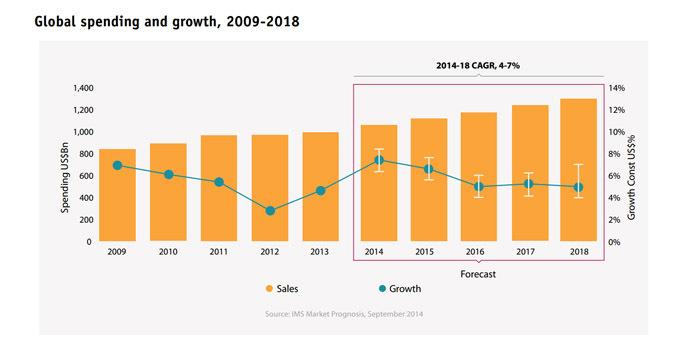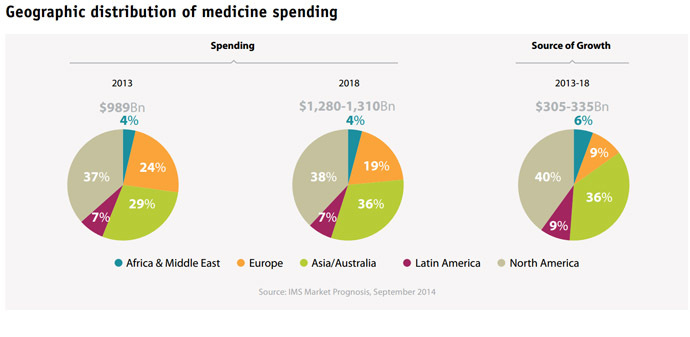(单词翻译:单击)
Global pharmaceutical spending will surpassthe trillion dollar threshold in 2014, with high prices for innovativehepatitis C and cancer drugs in the US, a new study says. By 2018spending is expected to increase by another 30 percent.
一份新发布的研究表明,2014年,全球药品支出将超过万亿美元,治疗丙型肝炎和癌症的创新药品为高价药。截至2018年,预计药品支出费用将再提高三成。

With an increase of 7 percent over 2013,total spending on medicines will amount to $1.06trillion in 2014, says the report"The Global Use of Medicines: Outlook through2018" from the IMS Institute for Healthcare Informatics, releasedThursday.
据美国艾美仕医疗信息研究所周四发布的名为《全球用药:展望2018》的报告,2013年的药品费用支出提高了7个百分点,而2014年的药品总支出将达1.06万亿美元。
In the next few years, by 2018, theincrease to $1.3 trillion will be due to about $100 billion on hepatitis Cdrugs, the same sums spent on cancer treatment, and $78 billion on diabetescare.
未来数年时间内,截止2018年,支出将上升至1.3万亿美元。而1000亿美元的丙型肝炎药物支出及同等的癌症治疗费用,还有780亿美元的糖尿病治疗费用都将是构成支出上升的因素。

The 30 percent increase is to be driven bymore specialty drug innovation, greater patient access to medicines and reducedimpact from patent expiry dates.
支出提升三成是由更专业的创新药品,更多患者支付得起药品以及放宽专利期限这些因素驱动的。
The American share in the total drugspending is about one third. IMS experts estimate that in 2014 it will rise11.7 percent. The UShas particularly high prices, according to the report, but drug makers defendthis by citing the soaring cost of new medicine development.
美国的药品支出费用约占总量三分之一,据艾美仕研究所专家估计,2014年这个数值将上升11.7个百分点。据报道,美国的药品支出费用价格特别高,但制药商解释说这是由于研制新药的成本猛增。
Spending on medicines in "pharmergingmarkets" will rise more than 50 percent over the next five years, ThePharma Letter said, citing IMS.
新闻网站PharmaLetter 援引艾美仕医疗信息研究所的话报道,“医药新兴市场”在医药方面的支出费用将在未来5年上升百分之五十以上。
With its goal of universal healthcaresystem coverage by 2020, Chinais expected to transform the medicine market, becoming the second largest afterthe US.In the next five years, Chinaexpects per capita spending to grow by 70 percent.
为实现2020年医疗保健制度覆盖全民的目标,中国将改革药品市场,这将使其成为仅次于美国的第二大药品支出市场。未来5年内,预计中国人均药品支出将增长70%。


